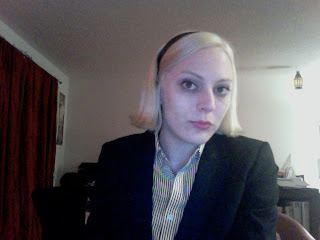Couldn't make it to our "How to Write an Abstract" Workshop with Dr. Ian Barnard? Not to worry, we have you covered!
Do I submit a paper I have written or do I write a new paper?
Here are some general tips for writing an abstract:
* Once you have been accepted, remember that the paper you present does not have to reflect what you stated in your abstract!
Why present at a conference at all?
- It's good to get feedback from scholars and peers
- You can share and show off your ideas!
- Join in a scholarly conversational.
- Network.
- It looks good on resume
- Party it up! Some conferences have big parties!
What are the steps for presenting at a conference?
- Find a call for papers (look on www.cfplist.com and www.cfp.english.upenn.edu)
- Beware of conferences that ask for more that $100 for a registration fee, as they could be a scam!
- Submit to many different conferences. You don't have to go to all of them. Some conferences are large (MLA, CCCC) and some are small (AGSE, graduate conferences). It may be a good idea to start with small ones if you have never done a conference before. Small conferences are generally more warm and welcoming.
- Peer referee process. Some conferences ask for no names on the abstract to make the selection process fair. Some ask for a CV (which generally means they are looking for big names).
Do I submit a paper I have written or do I write a new paper?
- As a graduate student, it's a good idea to submit an abstract for a paper you have already written, since we are all so busy writing papers anyways!
- You can submit an abstract for a paper you have not yet written. This is called the art of BSing! The drawback is that then you have to write an extra paper.
Here are some general tips for writing an abstract:
- In the language of your abstract, act like you already wrote the paper.
- Summarize your main argument.
- Show the significance to what is going on in the field - add your voice to the conversation.
- Indicate if you are going to do something different in your presentation (mode of presentation) other than just reading the paper. This can be everything from using multimedia to doing an interpretive dance.
- Try to polish your writing.
- Follow the abstract guidelines. Don't go over the word count.
- Connect your title to conference theme if possible. Title should also indicate the significance of your ideas.
- If submitting a creative writing piece, summarize what you are doing in your piece (AWP is a well-known conference for creative works).
- Use some buzz words (jargon), especially if your paper is heavy on the theory.
* Once you have been accepted, remember that the paper you present does not have to reflect what you stated in your abstract!
A big thank you for everyone who could make it and to Dr. Barnard for leading a fabulous and informative Workshop!
Stay tuned for part 2, coming Spring 2013







































